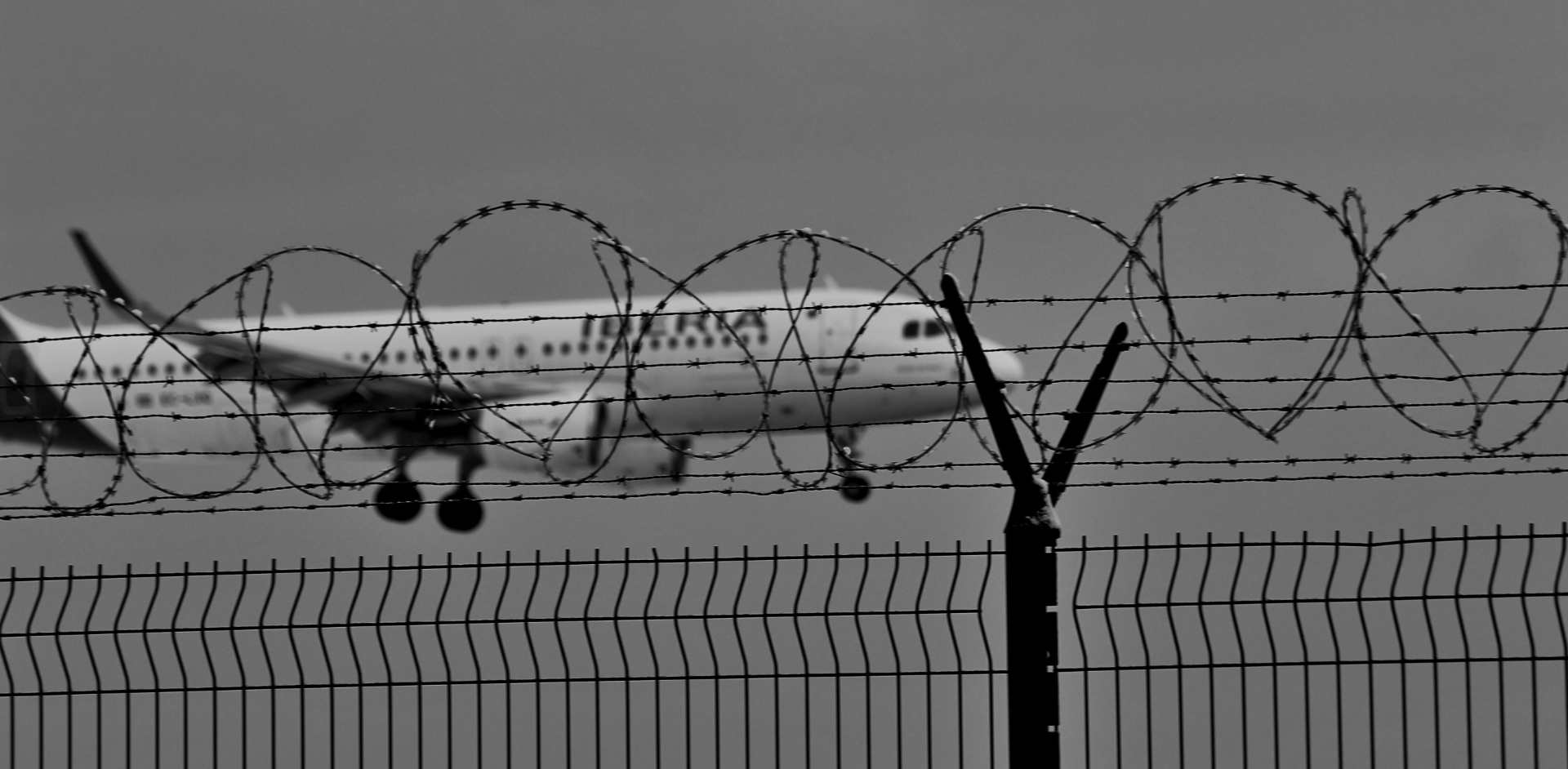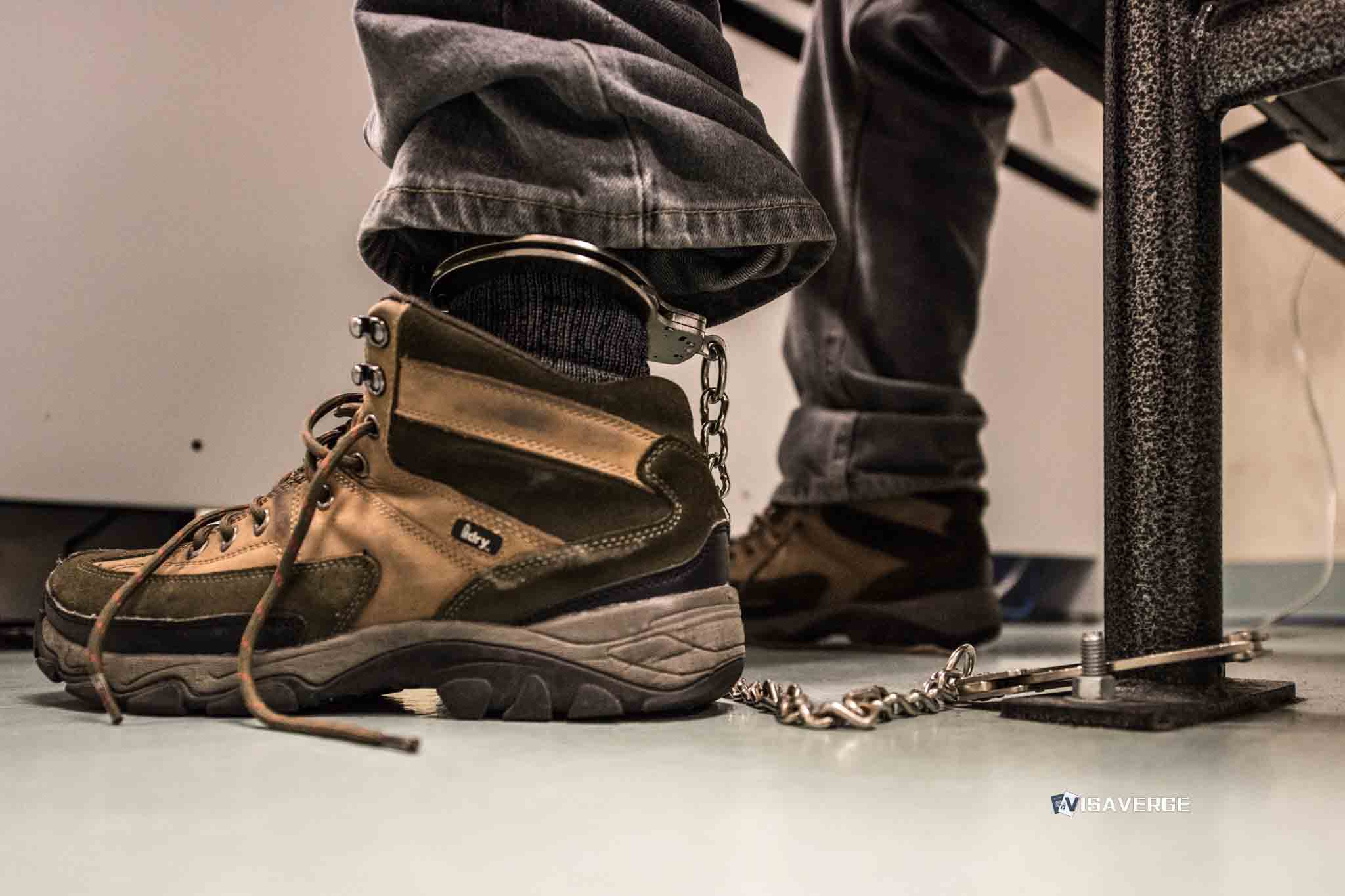(PHILADELPHIA, PENNSYLVANIA) An aviation safety worker at Philadelphia International Airport stood outside the terminal on his day off this week, holding a sign and asking travelers to call their lawmakers. Lane Conley, an airway transportation system specialist at Philadelphia International Airport (PHL), used his limited time away from duty to picket and press for an end to the federal government shutdown, which began on October 1, 2025 and has stretched into a fifth week.
Inside the airport, his colleagues kept working without pay. Air traffic controllers and Transportation Security Administration screeners ran shifts to keep flights moving and checkpoints open, even as they missed their first full paycheck and faced the prospect of losing the next one in two weeks. Conley said he felt compelled to be visible about the strain on people tasked with keeping planes and passengers safe. His teammates were still on the job, he said, but growing more anxious by the day about rent, car payments, and the rising cost of getting to work.

By Wednesday, November 5, 2025, PHL announced temporary closures of security checkpoints at Terminal F and Terminal A-West at the request of the Transportation Security Administration. The move, airport officials said, was a response to staffing shortages tied to the shutdown. Travelers reported long lines across other checkpoints and, in some cases, missed flights. Airport staff warned that disruptions would worsen if the stalemate continued. The closures landed hardest on connecting passengers and families traveling with children, who faced security queues that snaked around corners as morning rush hours collided with reduced screening capacity.
Workers on the front lines described long hours and empty pay envelopes.
“80 hours last week, and I received zero dollars in compensation,” said Charles Jaques, an air traffic controller at PHL who held up a blank paycheck stub from the pay period between October 5 and October 18, 2025. “I have two kids and a wife at home who can’t work due to medical issues, so I’m a single-income household, and right now this has put an extreme toll on me personally.”
Jaques said he had worked six days straight, like many of the air traffic controllers at the airport, and was preparing to do it again with no clear timeline for back pay.
About 130 air traffic controllers at PHL are now working six days a week without pay, union leaders said. On their only day off, many handed out flyers to travelers and urged them to contact Congress and demand an end to the shutdown. The flyers spelled out what officials and crews say is already visible: delayed training, deferred maintenance, and thinner staffing pools as more people call out or cannot afford gas, childcare, or tolls to get to work. For air traffic controllers, the grinding schedule means fewer opportunities for rest in a role that demands split-second decisions.
The airport’s Department of Aviation opened a food pantry for affected staff. Some employees said they struggle to access it because their shifts do not align with the pantry’s hours or because they are called in at the last moment to cover shortages. Others said they felt uneasy asking for help, even as they did the math on how to stretch what is left in their bank accounts across two more weeks without a paycheck.
The strain is especially acute for the people who conduct security screening and direct aircraft in congested East Coast airspace.
“a negative-2 right now,” is how morale feels, said Joe Shuker, Region 7 vice president for AFGE Council 100, which represents TSA workers. “You got us down here checking for bombs. And you got the air traffic controllers trying to keep the sky safe. You’ve got two high-stress jobs, and you’re adding more stress by not paying us.”
Shuker said he has heard from screeners who are taking on credit card debt to fill their gas tanks and parents choosing between childcare and showing up for a shift that might stretch or shift with little notice.
One TSA employee, Shuker said, told a supervisor she could not afford both childcare and gas to get to the airport and was told that was not an acceptable excuse for missing work. Union representatives said stories like that are piling up as the shutdown drags on. They point to increasing call-outs and greater risks of burnout as workers juggle overtime demands and financial uncertainty. In a security environment where attention and patience are essential, they warn that fatigue and pressure can spill over into performance.
The National Air Traffic Controllers Association, which represents controllers nationwide, said shutdowns “reduce the safety and efficiency” of flights by removing key people from the system and forcing those remaining to do more with less rest. The union also cited “critical safety and technology work” that cannot happen while so many specialists and technicians are furloughed. That includes upgrades, preventive maintenance, and training sessions designed to keep radios, radar, and navigation aids functioning reliably. Each delay, NATCA warns, can create a ripple effect that takes months to unwind once the government reopens.
Senior union officials say the repeated showdowns in Washington make it harder to hire and keep skilled people.
“You better prepare to not get paid every two years [when] there’s a government shutdown. That’s not very attractive. That’s not how you recruit the best and the brightest,” said Mike Christine, eastern regional vice president of the National Air Traffic Controllers Association.
Recruiting and training air traffic controllers takes years, and even small gaps in staffing can limit the number of flights that can safely move through busy corridors.
Conley, the aviation safety worker who spent his off hours picketing outside the terminal, said he wanted travelers to see the faces of the people holding the system together. He described colleagues who have picked up second jobs after shifts, sold personal items, or borrowed from family members to buy groceries. Several have shifted to public transit to save on parking and tolls, but others live far from the airport and cannot absorb the extra hours of commute time. As he stood along the curb where taxis and ride-shares cycle through, some passengers stopped to ask questions; others quietly offered thanks.
Travelers interviewed at PHL said they appreciate the workers who kept lines moving and planes departing despite the shutdown.
“I am happy that the people who run the nuts and bolts of our society are still respectful enough and honorable enough to show up to work and do the critical things that we need every day,” said Peter Fischer, in town for a conference.
“They keep us safe while we’re up in the sky,” said Dave Owens, who had just flown back from Orlando.
Many said they worried about travel around the holidays if the shutdown continues, particularly if more checkpoints close and more employees cannot afford to report to duty.
PHL’s announcement about checkpoint closures noted that the steps were taken at the request of the Transportation Security Administration. The agency has faced similar staffing pressures during previous shutdowns, when screeners worked without pay and call-out rates rose. At PHL, the closure of Terminal F and Terminal A-West checkpoints funneled more passengers through fewer lanes, increasing wait times and forcing some airlines to ask passengers to arrive earlier than usual. Airport officials said they are shifting staff and making operational changes where possible, but they cannot replace missing paychecks or paused federal work.
For air traffic controllers, the challenges extend beyond the tower and the radar room. Supervisors typically schedule recurrent training and simulation under normal operations; with the shutdown, those activities shrink or stop, according to union representatives. Meanwhile, long shifts and six-day workweeks leave less time for rest. On break, controllers swap notes about short-term strategies: sharing rides, postponing bill payments, and relying on family members for childcare when possible. The union said it is tracking the hours and the pressure, knowing that fatigue policy is designed for safety and that economics are now bending that curve.
Multiple workers said the empty paycheck that arrived after the October 5–18 pay period made the crisis feel real. Several said they had hoped Congress would resolve the budget impasse before that point. With another pay period ticking down, some are talking with landlords and mortgage lenders about extensions. Others are looking at higher-interest credit cards and community aid. The Department of Aviation’s food pantry has helped, they said, but cannot reach everyone who needs it, especially those working overnight shifts, when public transit options are scarce and grocery stores are closed when they finally clock out.
Within PHL’s terminals, the shutdown affects travelers in small but growing ways. Maintenance projects are delayed, and announcements of temporary changes are more common. On concourses, airline staff remind late-arriving passengers that security wait times are longer, directing them to different checkpoints when possible. Families with strollers and medical equipment face longer screening times as staffing ebbs and flows through the day. At peak times, gate agents hold boarding a few minutes longer for people still stuck in line, but the padding in flight schedules is limited.
Union leaders for TSA and air traffic controllers insist that safety remains the first priority, even in this crisis. They also say the shutdown’s daily grind chips at that foundation by adding stress to jobs that already demand precision and patience. For an Aviation safety worker like Conley, the pressure shows up as a string of competing demands: field equipment that needs attention, the urge to support coworkers inside, and the need to make his own case to the public outside. He said he’ll keep picketing during off hours and return to work to do his job, though every day without pay makes the choice harder.
At the airport’s arrivals hall on Wednesday, controllers and screeners handed out flyers that listed congressional switchboard numbers and points of contact. They asked travelers to call and ask for a budget vote. Some people paused to say thank you or to share their own stories of missed paychecks during earlier shutdowns. Others passed by quietly, pulling rolling bags and eyeing departure boards. A young family from South Jersey, running late for a flight to Chicago, tucked a flyer into a diaper bag and nodded to the workers at the entrance to a now-closed checkpoint.
The wider effects of the closure of Terminal F and Terminal A-West checkpoints will be clearer in the days ahead if no deal is reached. Regional carriers that use Terminal F often operate tight turnaround schedules, leaving little margin for long lines. International departures from A-West require additional screening steps, which depend on the same stretched pool of personnel. Airlines and airport officials have asked passengers to build in extra time and to check terminal updates before heading to the airport, a request that underscores how the shutdown is reshaping even basic travel routines at one of the Northeast’s busiest hubs.
As the fifth week begins, the question for many at Philadelphia International Airport is how much longer they can stretch. The first missed paycheck has already arrived, and the next one looms. Controllers and screeners describe a different kind of countdown now, measured in groceries and gas budgets, daycare fees, and overdue notices.
“You better prepare to not get paid every two years [when] there’s a government shutdown. That’s not very attractive. That’s not how you recruit the best and the brightest,” Christine said, summing up the long-term worry that the people who keep planes safely spaced and passengers screened will look for work elsewhere.
For now, travelers at PHL still see planes pushing back and lines moving, moderated by staffing moves and temporary fixes. But the people doing that work say the system is absorbing extra strain with every day of the government shutdown. NATCA’s warning that shutdowns “reduce the safety and efficiency” of flights, and prevent “critical safety and technology work” from being done, hangs over the concourses as both a caution and a plea. Conley, standing curbside with his sign after finishing a shift earlier in the week, put it bluntly in his decision to spend his free hours outside in the cold: the best way to protect aviation safety is to end the shutdown, get people paid, and put the system back on its full footing.
This Article in a Nutshell
Philadelphia International Airport staff, including roughly 130 air traffic controllers and multiple TSA screeners, are working without pay amid a federal shutdown that began October 1, 2025. Temporary checkpoint closures at Terminal F and A‑West on November 5 heightened delays and missed flights. Unions warn deferred maintenance, canceled training and worker fatigue reduce safety and hamper long-term recruitment. The airport opened a food pantry and employees picketed to urge Congress to restore funding and pay.













